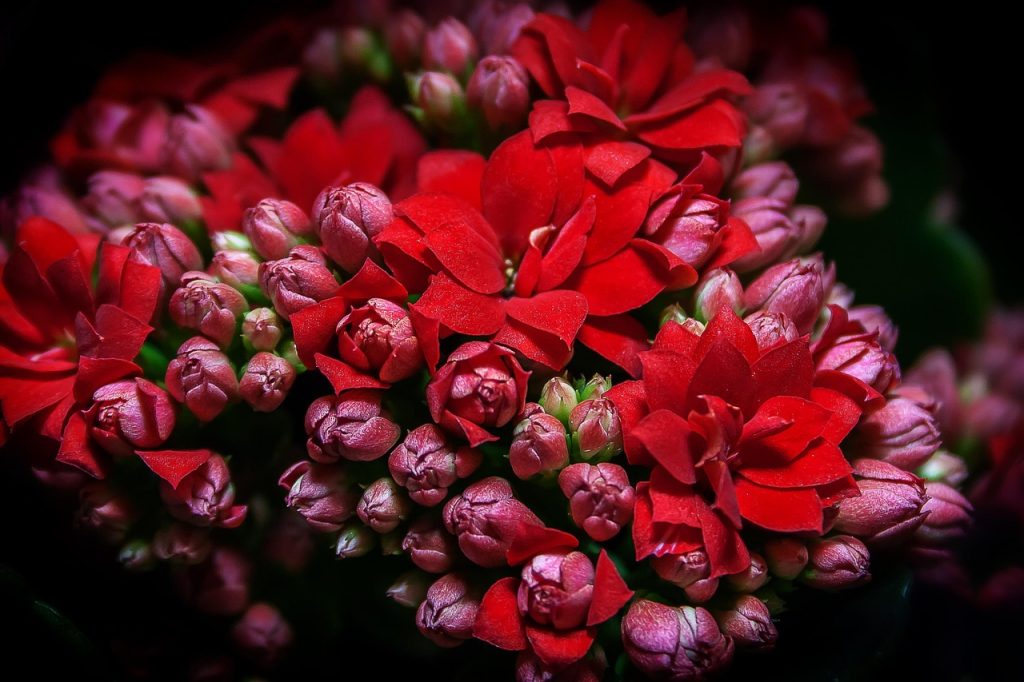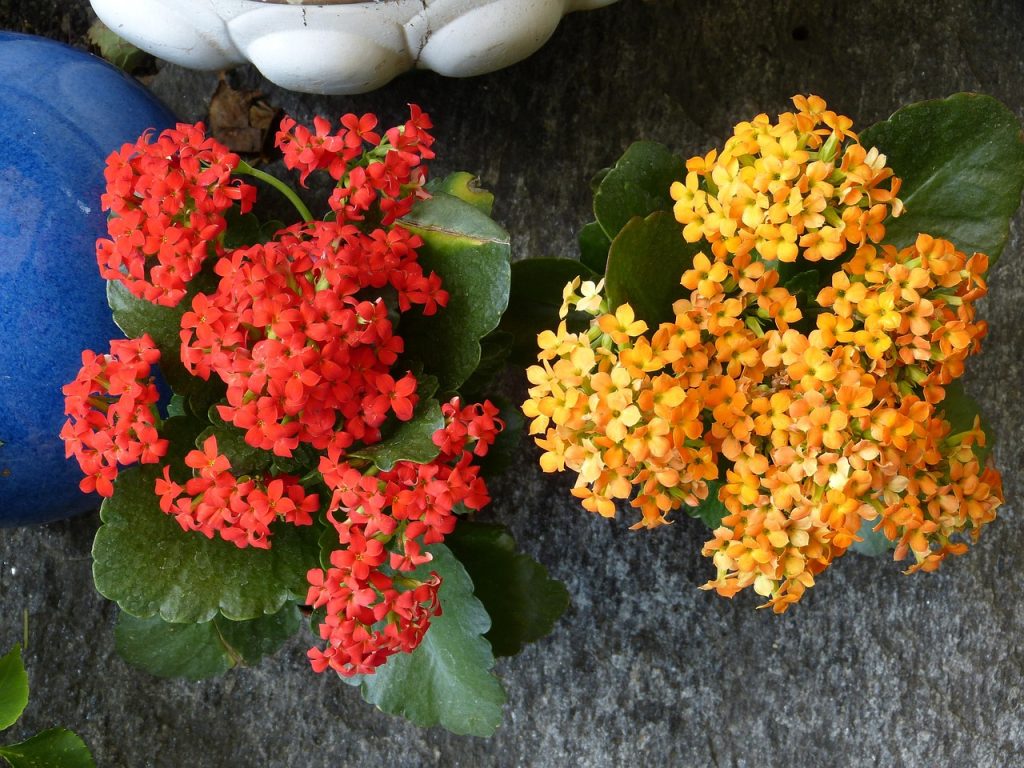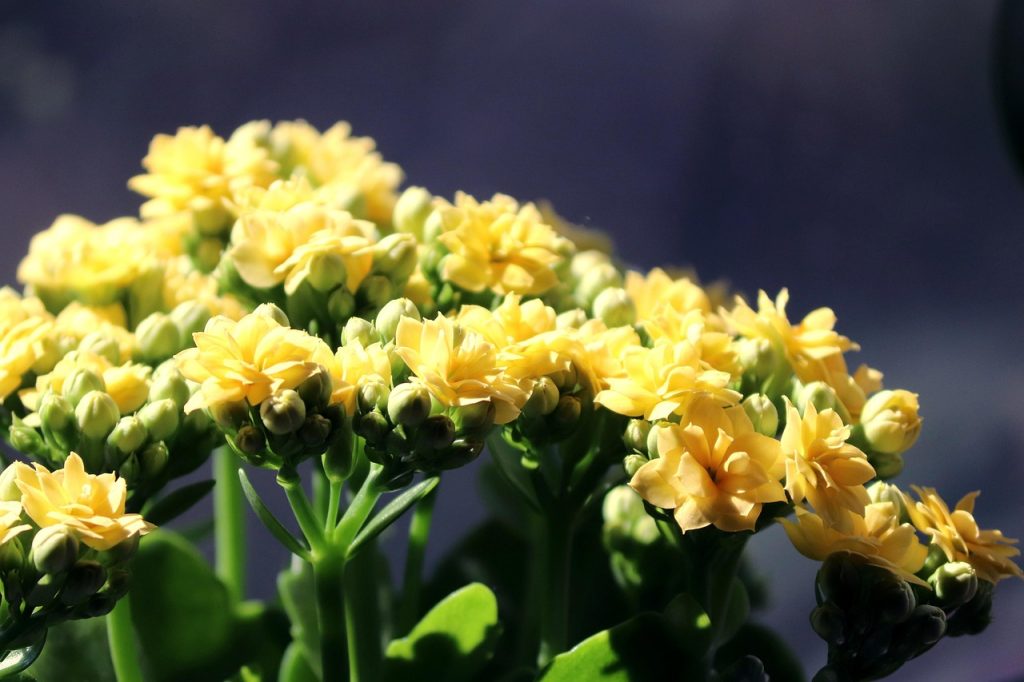The Kalanchoe plant is a favorite among indoor gardeners thanks to its colorful, long-lasting flowers and minimal maintenance needs. Whether you’re keeping a red, pink, or yellow variety, understanding proper Kalanchoe plant care ensures your plant thrives year-round. Native to Madagascar, this succulent is well-suited to both beginners and experienced plant lovers.
In this guide, you’ll find detailed Kalanchoe plant care instructions for indoors, outdoors, and even seasonal adjustments like winter care.

Kalanchoe Plant Care Indoors
Most people grow Kalanchoe indoors because it’s compact, decorative, and easy to manage.
- Light: Place near a sunny window with bright, indirect light. South-facing windows are ideal.
- Water: Use the soak-and-dry method; water only when the top inch of soil is dry.
- Humidity: Average household humidity works well, no misting required.
- Tip: Rotate the pot every few weeks so the plant grows evenly toward the light.
Indoor care is especially popular for florist Kalanchoe plant care, since these gift-shop plants are usually sold in bloom and need bright but gentle conditions to continue flowering.
Kalanchoe Plant Care Outdoors
While Kalanchoe is typically grown indoors, it also performs beautifully outdoors in warm climates.
- Placement: Select a spot that receives morning sun and afternoon shade.
- Temperature: Best outdoors in USDA zones 10–12. Bring indoors if temperatures drop below 50°F (10°C).
- Soil: Use sandy, well-draining soil to prevent root rot.
- Watering: Water once a week in summer, less during cooler months.
When practicing outdoors Kalanchoe care, be cautious of heavy rain. Too much water can damage roots, so container growing is often best.
Seasonal Guide: Kalanchoe Plant Care in Winter
Winter care is crucial for long-term plant health.
- Reduce watering to once every 2–3 weeks, as growth slows down.
- Keep the plant in a warm room above 60°F (15°C).
- Avoid placing near heaters or drafty windows.
- If you want blooms in spring, provide 14 hours of darkness daily for 6 weeks to trigger bud formation.
By adjusting watering and light during colder months, you’ll master Kalanchoe care in winter and encourage healthy blooms for the next season.
Flower Colors and Their Care Differences
While general care is the same, some varieties need slight adjustments.
Red Kalanchoe Plant Care
- Red varieties love bright light to keep their color vibrant.
- Deadhead faded blooms promptly for continuous flowering.

Pink Kalanchoe Plant Care
- Pink blooms may fade in low light—place near a window for best results.
- Works well as a gift plant with minimal maintenance.
Yellow Kalanchoe Plant Care
- Needs consistent indirect sunlight to maintain rich color.
- Avoid overwatering, as yellow blooms are more prone to wilting if roots stay soggy.
No matter the color, proper watering, pruning, and occasional fertilizing keep them blooming beautifully.
Kalanchoe Plant Care Instructions
Here’s a quick checklist for all Kalanchoe owners:
- Light: Bright, indirect sunlight for 6–8 hours daily.
- Watering: Every 1–2 weeks, allowing soil to dry.
- Soil: Cactus or succulent mix with excellent drainage.
- Temperature: 60–85°F (15–29°C), never below 50°F (10°C).
- Fertilizer: Monthly in spring/summer with a balanced liquid feed.
- Pruning: Remove dead flowers and leggy stems.
- Propagation: Stem or leaf cuttings in spring/summer.
These Kalanchoe plant care instructions apply universally, but adjusting them slightly for indoor or outdoor placement ensures better growth.
Extra Tips for Florist Kalanchoe Plant Care
Florist Kalanchoes, often sold around holidays, need special attention once their first bloom cycle ends.
- Cut back spent flowers to encourage reblooming.
- Provide the “dark treatment” (14 hours of nightly darkness) to trigger flower buds.
- Repot in fresh soil if the nursery pot is too small.
With this approach, florist Kalanchoes can bloom year after year instead of being a one-time display.

Common Problems and Solutions
| Problem | Cause | Fix |
|---|---|---|
| Yellow leaves | Overwatering | Let soil dry, check drainage |
| No flowers | Lack of darkness/light cycle | Provide 14 hrs darkness daily |
| Brown leaves | Sunburn or irregular watering | Move to indirect light, adjust watering |
| Leggy growth | Low light indoors | Rotate plant or move closer to window |
| Drooping flowers | Old blooms or low light | Deadhead and move to brighter spot |
FAQs
Indoors, provide bright windowsill light and water sparingly. Outdoors, keep in partial sun with well-drained soil.
Yes, reduce watering and keep it warm. Provide extended darkness if you want blooms in spring.
Yes, but color vibrancy is stronger with more light, so place colored varieties in the brightest indoor spots.
Yes, with pruning and proper light cycles, florist varieties can rebloom for years.
No, all Kalanchoe varieties are toxic to cats and dogs if eaten.
Final Thoughts
With its vibrant colors, long-lasting blooms, and minimal upkeep, the Kalanchoe plant is one of the easiest and most rewarding succulents you can grow. Whether you’re focusing on Kalanchoe care indoors, placing one outdoors in warm weather, or adjusting Kalanchoe plant care in winter, this plant adapts beautifully to different environments.
By following these simple yet effective Kalanchoe plant care instructions, you’ll enjoy stunning red, pink, or yellow blossoms that brighten your home for years to come.